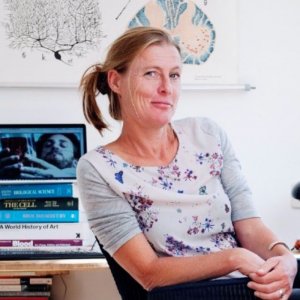
What is NetworkNature Reads?
#NetworkNatureReads is inspired by #ReadingRainbow and the #NewYorkTimes #ByTheBook series, both of which spread a love of reading by highlighting stand out books and the people who love them. Our goal is to do the same, but with a #naturebasedsolutions flavor. Every month, we will feature one book selected by a NetworkNature member.
We believe that literature widens perspectives and can foster connection with human and environmental communities. Read Wild Geese by Mary Oliver if you aren’t sure what we mean.
This month’s interviewee is Ellen ter Gast PhD
Ellen studied both medical biology and philosophy and holds a PhD in bio-philosophy. In her thesis, Biotech Pioneers, Ellen examined how modern biotechnology is reshaping our understanding of ourselves as a species and our relationship with the natural world. Currently, she work as an independent ethics advisor, preferably in multidisciplinary research projects.
Want to get involved? Contact hello@networknature.eu to suggest a book!
Book: Into the Wild by Jon Krakauer (1996)
This book is based on a true story. It is about a young student who hitchhikes to Alaska, where he tries to survive in the wilderness.
Tell us about yourself! What role do nature and reading play in your life?
I have always been fascinated by the mysteries of life and the way we make sense of them. The ecological challenges we are faced with today raise a number of questions that are food for thought to bio-philosophers like me. How do we, humans, interfere with natural processes? What responsibility do we have towards non-human species? How do we ‘fix’ the ‘damage’ we did to the ecosystem? What does ‘natural’ mean? Are we unnatural? I find the answers at the cross-section between art, literature, science and philosophy.
Which book did you pick and why?
I choose Into the wild, Jon Krakauer (1996). But I have to confess, I didn’t read the book. So here, I discuss the 2007 drama film written, co-produced, and directed by Sean Penn. I picked this movie because of the highly romantic and at the same time problematic desire of the protagonist of the story to go back to nature. His romantic view is, in short, based on the following widespread belief: nature is inherently good (but defenseless) and culture (as the product of modern techno-scientific thinking) represents a threat to this nature.
Can you share a specific moment from the book that resonates with you personally? How does it connect to your work with Nature-based Solutions projects?
What struck me most about this movie was the contrast between the naïve ideas about living in the wild of the protagonist and hard reality. Spoiler alert, he does not survive. Being a city boy, he is lacking essential botanical knowledge. But nature does not care he dies. Only we do.
In what ways do you see the themes or lessons from the book aligning with the goals of conservation and the challenges we face in combating biodiversity loss today?
Nature is not defenseless. Nature will survive the apocalypse. We won’t. Nature has no will. Nature has no future plans. We do.
I think that acknowledging this is of key importance in environmental ethics. As a result of ongoing human technological intervention, Earth is right now in a state of deep ecological crisis. This is primarily our problem. We, scientists, are aware of the impact humans have on the planet. It is our duty to clean up the mess we made because this is how we experience responsibility. If biodiversity is decreasing due to our dominant presence, we have to undertake action.
However, going back in time and back to nature is not the solution to the challenges we face today. We have to look forward. The desired outcomes of our actions now should be based on ideas and visions we have of a healthy and livable planet today. We value biodiversity. We value wilderness. We want ecosystems to be in balance. Our beliefs are based on both science, ethics and aesthetics.
If you were recommending this book to a colleague or a friend within the conservation community, what key takeaway or message would you highlight?
This movie challenges romantic view of nature. It makes you humble. It made me aware of my own romantic ideas. My ethical beliefs are loaded with aesthetic notions of nature.
